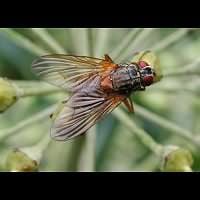Flies
Flies are classed as pests and their presence may cause a nuisance by virtue of the Environmental Protection Act 1990.
The Isle of Wight Council enforces the Environmental Protection Act 1990 and does not provide a pest control service.
The landowner may have to pay for the treatment.
Click here for a list of the Council’s Approved Pest Control Contractors
Identification:
There are many types of flies but the following are the most common cause of problems
- The common house fly (Musca domestica).
- The lesser house fly (Fannia canicularis)
- The autumn fly ( musca autumnalis)
- The cluster fly (Pollenia rudis)
The Common House Fly: the female can lay 120- 150 eggs at a time. The eggs may hatch into maggots within 8-48 hours. The maggots will burrow into the food source where they will develop. The new fly can emerge within 4 days in favourable conditions to weeks in the cooler weather. The earliest flies emerge in May. Breeding virtually ceases in October except in warm premises.
The lesser house fly: has a similar life cycle to the common house fly. It is identifiable by its fast darting movements.
The Cluster Fly:
This fly is named as such by virtue of its swarm like clustering. It is larger than the common house fly and can be identified because it folds its wings over its back. The cluster fly enters premises in the autumn months for hibernation and leaves in the spring. In the autumn the flies tend to cluster in such areas as roof spaces, cavities and windows. The cluster fly is a parasite of earthworms.
The Autumn Fly: Autumn flies are similar in appearance to the house fly. They are only found in premises during the autumn months – hence their name. These flies breed in cow manure normally in rural areas.
A photograph of the common house fly.
CONTROL.
The common house fly: Dustbins should be kept clean and all foodstuffs should be wrapped up. Fly papers are effective as are knock down spray.
The lesser house fly: As with the house fly control measures should be taken at source. Daily spraying can control any adult flies.
The cluster fly: a knock down spray can be effective. In greater numbers fly strips are particularly effective. Foodstuffs should be covered at all times.
The autumn fly: please refer to control for the cluster fly.
For more information regarding this Leaflet please contact:
Environmental Health Service
Jubilee Stores
The Quay
Newport
Isle of Wight
PO30 2EH.
Telephone: 01983 823000
Facsimile: 01983 529804
©Isle of Wight Council, May 2004
©Isle of Wight Council, May 2004
Page last updated on: 30/08/2007






